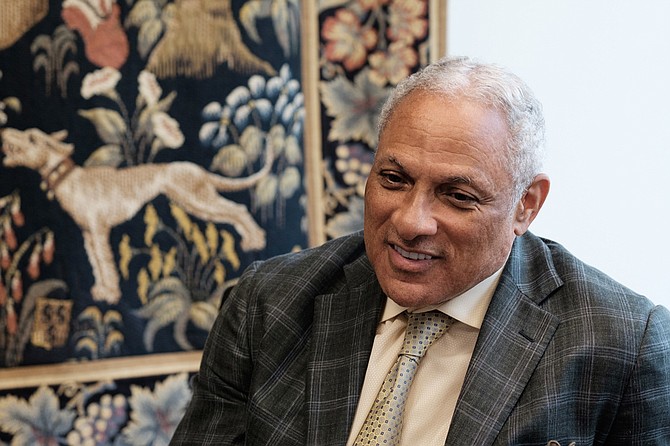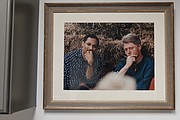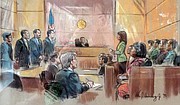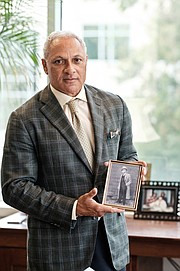Democratic U.S. Senate nominee Mike Espy served as the U.S. secretary of agriculture under President Bill Clinton from 1993 to 1994. He is pictured at his office and campaign headquarters in Jackson. Photo by Ashton Pittman.
JACKSON — On every wall of U.S. Senate candidate Mike Espy's office in Jackson hangs a photo or a painting that means something to the Yazoo City native. On a Friday afternoon in August, he points to a painting of Mississippi civil-rights activist Fannie Lou Hamer, describing as his "matriarch" the woman who co-founded the Freedom Democratic Party and famously demanded equal representation for black voters at the 1964 Democratic National Convention.
The candidate proudly displays photos of his father and grandfather, men who were both historic in their own right. His grandfather, Thomas Jefferson Huddleston, was born the son of former slaves, but went on to found a health-care company, owned 36 funeral homes, owned a newspaper with more than 100,000 subscribers and built a hospital in Yazoo City—the very hospital where Espy was born in 1953.
In 1994, when Espy was President Clinton's secretary of agriculture, the U.S. Justice Department launched an investigation amid accusations that he had illegally accepted gifts from companies he was in charge of regulating. Espy resigned that December, but insisted he was innocent, refusing a plea deal that would have reduced 36 felony charges to a misdemeanor and risking years in prison. In 1998, a jury found him not guilty on all counts; a sketch artist's image of the moment the verdict was read now hangs in his office.
Espy has neither sought nor served in public office since that time; this year's U.S. Senate special election marks Espy's re-entry into politics as he runs in the special election for the seat formerly held by his friend, Republican Sen. Thad Cochran. If he wins, he will make history as the first black U.S. senator from Mississippi since the Reconstruction era, just as when he became the first black congressman from Mississippi since that period after the Civil War when the federal government made it easier for black people to both vote and run for office until Jim Crow segregation laws again suppressed black voting power.
Last month, Espy spoke to the Jackson Free Press about both his history and his approach to this campaign.
Why has it been so long since you've run for public office since you last served in 1994?
I haven't held elected office in, you're right, about 25 years because I had to rebuild a life, frankly. I got knocked off stride after my tenure as secretary of agriculture. Allegations were made against me. I had to fight those. It took four years to fight those. It cost the taxpayers of America $26 million, and it cost me about $1.3 million to defend my good name, and that came out of my pocket and (from) a lot of well-meaning friends. I also wanted to practice law. The political experience was searing for me. I enjoyed the policy of it, but I didn't enjoy the process of it. I love policy. So I just decided to throw myself into my work. I got remarried, and I had a son. I've tried to be a good father to him and to them. And you just snap your fingers, and 20 years have gone by. I had to rebuild my economic base. My name was always good. But I just had to rebuild myself and my profession.
Why did you choose this race?
I know I've got the knowledge, and I know I have the experience to bring to bear results to solve the big problems. So when the senator resigned, I shut my door, and I prayed about it. I called my wife to get her blessing, and we launched it. Because I believe, really, that there's three big things I can bring to this race and Mississippi right now: the first is process, the second is policy, and the third is image.
On process, I think the solution to what ails us in so many ways depends on consensus building. Not believing that everybody else is stupid. Not calling names, but because if you got up there, it's because you've got something to offer. I believe I can be a bridge builder and someone who reaches across the chasm—whether it's a racial chasm or a party chasm. I am a Democrat, but I'll never be the Democratic nominee because this race doesn't call for any primaries. So to me, the scenario of this race would enable me to speak more as an individual, as Mike Espy. Yes, Mike Espy's a Democrat, but Mike Espy's an independent thinker, an independent person who doesn't allow anybody to tell him what to think or what to say. So I'll work with anyone as long as the goal is to improve Mississippi.
When you walked in his office, Thad didn't ask you if you were a Republican or Democrat, black or white; he asked you to sit there and listened to you. I know I'm the same kind of person, and that's the type of bearing I'll bring to the Senate race.
Talk about how your experience prepares you to be senator.
I am the only person in this race if you look at the field of candidates with the depth and breadth of experience, period. I've been in the Congress for six years. I've been at the highest levels of the negotiating tables. I know I can do the job. Look at Mississippi, a state with so many needs—education, healthcare, jobs, housing—and just people not having aspirations like they should. I think I could bring to bear my experience in Washington and the gravitas. I have been there in those rooms, and I know what they're pitching, I know what they're saying, and I believe I can be trusted to bring positive benefits to all those issues. We are the forgotten state in so many ways.
People disparage Mississippi, and people don't think well of Mississippi. And I know they do, and you know they do. And some of those criticisms are well placed, but many of them are not. And I believe that on November 7, if they wake up, and I'm senator, that image will change overnight. They're choosing new symbols and new representatives and people who comport themselves in such a way as to bring credit to the state.
Can you explain the meaning of that painting of Fannie Lou Hamer for you?
She's my matriarch. When I decided to run, I called my wife, but I also went to Ruleville (Hamer's hometown). I went to her grave. And I'm asking for her to give me the strength and energy for a race as difficult as this race, and I'm doing that in all humility because I've never been beaten in jail like Fannie Lou Hamer. I've been called the n-word time and time again, but not to the degree that she was. And ever since I've been born, we've had the right to vote.
So she had to go through difficult circumstances to offer herself as a candidate for Congress in 1964 as a member of the Freedom Democratic Party. And she realized she would not be elected. She only did it to serve as that beacon to shine the light on justice and voting rights for those who had been oppressed and suppressed.
The Voting Rights Act had just been signed, and she knew it would put her at great risk of harm and physical danger, but yet she did it. I see her as a person of great courage, and just a heroine to put herself in that position. If she could do it in 1964, then I could do it in 1986, and I did it; I was the first African American congressman to be elected since the Civil War (era). Not the first one to try it—the first one to do it. She was the first one to try.
You would be the first black senator elected from Mississippi and the first to serve in Washington since Hiram Revels and Blanche K. Bruce.
I've read Hiram Revels' book just like I've read the book of John Roy Lynch, who was the first black congressman before me. It's a lot of the same things if you account for the march of history.
I'd be the first black senator since Reconstruction. But I'm not dwelling on that, because I tell people, it's not just that I want to be something; it's more that I want to do something. But history's history.
I didn't know Cochran would resign and make this historical opportunity available. I didn't know it when I ran in '86. (President) Ronald Reagan was in office at that time, and there were some policies which I felt were not to the benefit of the state or to my constituents.
Would you support making sexual orientation and gender identity protected classes under the federal Civil Rights Act?
When I sat down at my computer when I got the notice that Cochran was going to resign, before any consultants, before any wordsmiths, before anybody came in to coach me on what to say, I wrote my statement of candidacy. I wrote it myself. Every word comes from my fingers.
And in that statement, it says that we believe in the dignity of all people irrespective of race, gender, religion, disability or sexual orientation. It's not my job to judge anybody; that's God's job. It's my role to make sure that everybody has an opportunity to improve their lot in life.
I put that in my statement of candidacy, and I put it online for everyone to read. I don't want to repress, demean or ostracize anybody. So I'm open.
Your Republican opponents' campaigns have each focused a lot on who supports President Trump most. How can you break through the appetite that many Mississippians have for conservative bravado?
First, I'm not trying to focus on either of the other two candidates. I'm running for office of U.S. Senate irrespective of whoever runs or what they're saying or what they're doing. I've noticed that both of them are trying to be the one closest to the president, and they have their reasons for doing that. I'm not in that game. I'm not trying to get close to the president. I'm trying not to mention him at all, really.
I respect the office of the president of the United States, and regardless of who's in the office, I will work with them if the issues concern uplifting the state of Mississippi. I tell everybody: I'm a Democrat. I'm going to caucus with (New York Democratic Sen.) Chuck Schumer. But if Chuck Schumer proposes something against the interests of Mississippi, I'm going to oppose Chuck Schumer.
When the other candidates talk about who's more conservative—cutting the taxes or reducing the budget, whatever—I chuckle. At the Neshoba County Fair, I said, "People come up here talking about what they want to do and putting on the mantle of conservatism when I've already done this." All I can do is tell you what I've done. And if you want to call it conservative, that's what you call it. I call it common-sense policies.
Can you provide an example of a conservative action you've taken?
When I walked into the (U.S. Department of Agriculture) in 1993, I had 124,000 employees. And that might've been OK in 1863 when President Lincoln created USDA because the majority of Americans were farmers. But when I walked in in '93, only 2 percent of the people farmed. I said, it's just too many. I know we don't do just farming, but it's still way too many employees.
So I said, I'm not going to make everybody leave, but I'm going to give you an incentive package. So we put on the table an incentive package of $25,000 for every person who would leave within 30 days. And we had 7,500 people who took advantage. Look what we saved in overhead costs, in salaries, in benefits, in retirements.
So when the Republicans talk about how government is too big and downsizing government, I'm chuckling, because I've already done this. I have measurable outcomes. Go back and read my speeches. Go back and factcheck me. I've already done what you've said, and I was a Democrat.
When former Hattiesburg Mayor Johnny DuPree ran to become Mississippi's first black governor, but lost. How are you getting your message to black voters?
I can't win with black votes alone. I know that. Hell, I shouldn't even be senator if that was the case because I wouldn't be senator of everybody. I have to go and ask everybody for their support because I have to earn the support of everybody. And that's what I've been doing since March.
I'm not naive. I know this race will turn on the excitement of African Americans as well. They have to know that I'm viable, that I was historic in 1986, and they have to know that there's a possibility of another historic victory on November 6. And that's up to me and the (other) people in this room to generate that turnout.
Mayor DuPree is a friend of mine. He's very frank, and he told me (winning is) a matter of resources. So, my first job is to bring greater resources into the campaign. I believe we're going to get everything we need resource-wise to win the race, and then we have to be very efficient. It wasn't that they didn't vote for Mayor DuPree; it was that maybe they didn't know he was running. Maybe they weren't informed about the race.
There a lot of African Americans in Mississippi that have not voted for anyone since Barack Obama's re-election. But we know where they are. We've got them in our file system. We know where they live. We know how many times they've voted. We know everything that technology can give you. Now whether we get them out, that's something else.
What about millennial voters?
I've got gray hair, so I've got to surround myself with millennials. They've got to give me advice and knowledge and show me the best way to inform them and excite them. And I think the best way to excite them is to tell them what I can do for them—such as how I can help eliminate their student debt.
The second thing to do is to make sure that when they graduate schools ,there are jobs available. We can work with state officials to make sure two-year technical schools are free or very low cost. So we just have to make sure we sit down with them on a peer-to-peer basis. They call them the "me generation," and so we've got to sit down with them to show what we can do to make sure their "me" is a better "me."
You showed me an NRA award you got in 1988 and said your views on gun rights have changed since then.
From '71 to '75, I was a member of the NRA because I was using their rifle range (as a student at Howard University in Washington, D.C.). When I ran for Congress, there was an opportunity to get their endorsement. I looked at their code and what they believed in and what I believed in, and I decided to renew my membership in 1986. That's because I believe in the Second Amendment—I did then and I do now. I'm not running away from that, but things have changed. You know how Republicans who were Democrats say, "I didn't leave the party; the party left me"? I can just say, "I didn't leave the NRA; the NRA left me." Because now they're really right wing.
I believe that anyone who has been declared a danger to himself or others should not own a firearm at all. I don't mind assault weapons being sold, but I don't think anyone should own them unless they're 21 years of age. I think we should have enough technology to outfit every school if it comes to that to detect firearms if they come in the school. That's the farthest I'm going to go. I do not believe teachers need to be armed.
I am sobered about the number of school shootings. I got the Silver Rifle in 1988 because my voting record was almost 100 percent. I still have firearms in the my house right now. I'm less of a hunter than I am a fisher, but I taught my son and my wife how to shoot at a fire range here in Jackson, so if you come to my house with an evil intent, you're going to get a big surprise.
Explain your abortion stance.
I'll say it this way: I'm anti-abortion, but I'm pro-choice. My daughter has one child, my only grandson. I've got three grandchildren, but only one grandson. She's my only daughter. I'm glad she had the baby. But if there was an issue at the time, and she had called me for counseling, I would have counseled her to have the baby. But at the same time, it's her choice not to. That's her legal choice.
There's a push for a voter initiative in Mississippi on medical marijuana for 2020. What's your position?
I'd be open to reviewing the statistics. The main thing for me is, is it safe? Is it a revenue enhancer? We need more revenue in Mississippi. So just like legalized betting, I'd be open to reviewing the facts and the economic estimates of what that would bring to the state's coffers. So I would never tell you no to either one of them. If we did it, maybe medical marijuana first.
But there are a lot of studies out there about how if you are under the influence it still impairs your ability. I would just have to know if it was safe and if it was a financial benefit to the state.
Talk about the investigation and your trial in the '90s.
I refused all plea bargains because I was innocent. I plead not guilty when the judge asked me, and I was proven not guilty by the jury. I followed American jurisprudence. I was a defendant in a lawsuit. And they put up 70 witnesses against me. If you read the history, I didn't put up any in my own defense. Why? Because I was not guilty. I wanted to be so demonstrably not guilty that the jury would see the whole thing was silly—and they did.
After I was acquitted, there were two jurors who made statements publicly, and one said it was the most bogus thing she'd ever seen, because the prosecution could not connect the dots, because there were no dots to connect. Another juror said it was all a waste of time.
It took four years—not because of anything I did, but because of the process the independent counsel had to follow. Every piece of paper they asked me for I gave to them. They could not find—after four years of investigation—where I gave any favors to any companies I regulated. They couldn't find any because there weren't any. About a month before trial, the prosecutor told me that if I would plead guilty they would go from 36 counts to one count. And I said, 'No, I'm not guilty.' About a week before trial, they said, "OK, OK, we'll go from 36 to one, and you can choose your prison." They said they'd recommend a prison in Florida or wherever. And I told them, "No, I don't play golf like that."
Now, if (opponents) want to raise all this again, they can, but I can only say this: It doesn't matter what they call you; it only matters what you answer to. I answer to exonerated. I answer to someone who sat four years through that, and I believe I'm stronger, I'm wiser, and I'm more faithful, because I believe in God, I believe in the Lord, I believe that through me he's working his will, and if it's his will, I'm going to win this race.
What parts of Senator Cochran's legacy do you hope to continue in the Senate?
Calm demeanor. Professional disposition. Extensive knowledge. Friend of those even in the other party. And not a demagogue. All of that about him is also me.
Comment at jfp.ms/2018elections. Follow Ashton Pittman on Twitter @ashtonpittman. Email him story ideas to ashton@jacksonfreepress.com.
Mike Espy is a Democratic candidate running for U.S. Senate in the special election for the seat former Sen. Thad Cochran retired from in March. In 1986, voters elected Espy to the U.S. House, making him the first black Congressman from Mississippi since Reconstruction. In 1993, President Bill Clinton appointed Espy as his U.S. secretary of agriculture, where he served until his resignation in December 1994.
Elections for Mississippi's U.S. Senate seats are Nov. 6. In the special election for Sen. Cindy Hyde-Smith's seat, if no one gets more than 50 percent of the vote, the election goes to a runoff. Polls are open from 7 a.m. to 7 p.m.
More like this story
More stories by this author
- Governor Attempts to Ban Mississippi Abortions, Citing Need to Preserve PPE
- Rep. Palazzo: Rural Hospitals ‘On Brink’ of ‘Collapse,’ Need Relief Amid Pandemic
- Two Mississippi Congressmen Skip Vote on COVID-19 Emergency Response Bill
- 'Do Not Go to Church': Three Forrest County Coronavirus Cases Bring Warnings
- 'An Abortion Desert': Mississippi Women May Feel Effect of Louisiana Case







Comments
Use the comment form below to begin a discussion about this content.